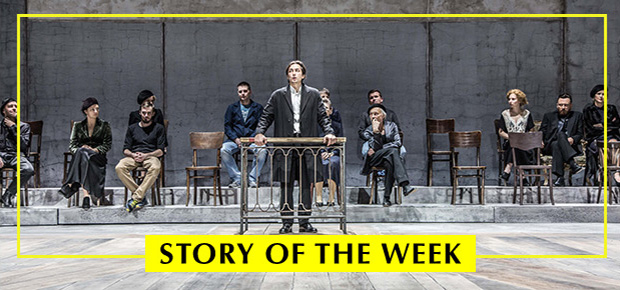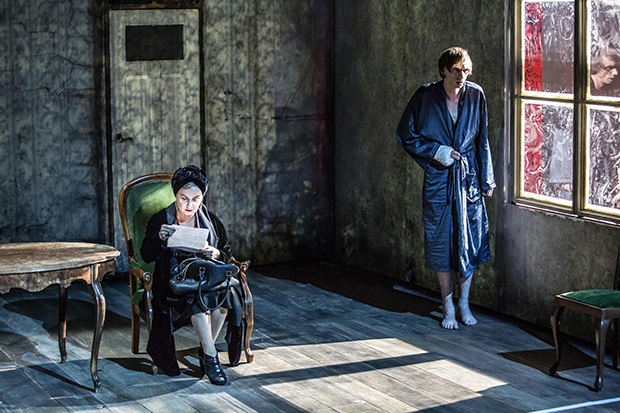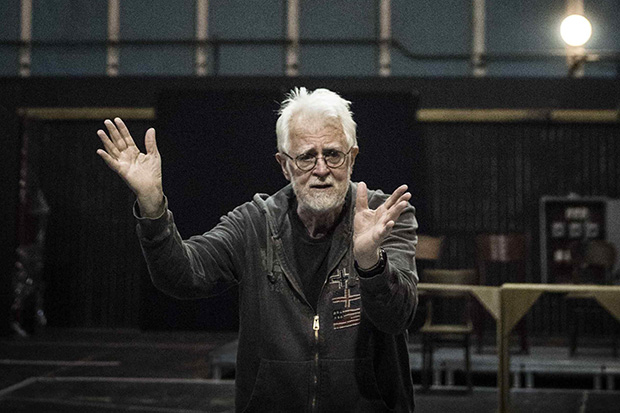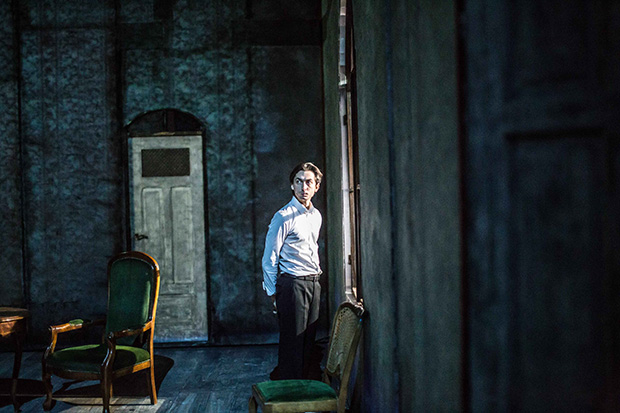How Did the Polish Government Cancel a Show in New York?
In a scenario straight out of Kafka, director Krystian Lupa learned his production was defunded in an opaque letter.

(© Natalia Kabanow)
This week, NYU Skirball announced the cancellation of its planned run of The Trial, Franz Kafka's 1925 novel, adapted to the stage by Polish director Krystian Lupa. The official reason was the withdrawal of funds by the Adam Mickiewicz Institute, a division of the Polish Cultural Ministry charged with promoting Polish culture abroad. Lupa was quick to label this censorship, pointing a finger at Poland's rightwing Law and Justice Party, which currently dominates the government. But how is it possible for a foreign government to censor a play in New York?
This Story of the Week will explain how it happened, and how the artists are responding.
What is The Trial?
Published in 1925, one year after Kafka's death, The Trial tells the story of Josef K., a bank cashier who is arrested for an unspecified crime and subjected to an incomprehensible trial. Lupa, who is a celebrated theater director in Poland, adapted the novel into a nearly five-hour stage play that not only tells Kafka's story, but illuminates the personal circumstances under which he wrote it. It has been produced successfully in Poland and France. The two-day run at Skirball (March 7 and 8) was going to be the production's North American debut.
"Kafka's The Trial is the story of political corruption, government censorship, and social malevolence — a story that mirrors our current global realities," said Skirball director Jay Wegman in a press statement. "Sadly, and ironically, the Polish government has pulled its funding in an attempt to silence Krystian Lupa, making this North American premiere impossible."

(© Natalia Kabanow)
Why was The Trial canceled?
According to reporting in The Forward, Lupa and his company were counting on the government-run Adam Mickiewicz Institute (AMI) to fund the hefty cost of travel and lodging for the 46-member company of The Trial, and AMI director Krzysztof Olendzki, who visited Skirball last year, had promised as much. But when Olendzki was replaced in September by Barbara Schabowska (a pro-Law and Justice Party journalist), the talks with AMI broke down and funding was revoked through an official letter, with no explanation why — a Kafkaesque flourish if there ever was one.
In his four-year stint as Poland's Minister of Culture, Piotr Gliński has led a campaign to make the country's cultural institutions friendlier to the Catholic and nationalist sympathies of his Law and Justice Party. In a recent statement to the New York Times, Gliński insisted that the government was "restoring the right balance and building a fair system, in which every artist, regardless of his/her views, can count on the support of the state." In practice, this appears to mean defunding artists with whom the Law and Justice Party disagrees.
Lupa is blunt in his assessment: "The declaration of Minister Gliński is clear: Artists who do not sympathize with the current leadership's cultural policy, who criticize its values, decisions and actions will be treated as enemies of Poland and will not be supported by the Ministry of Culture and National Heritage in any form."
Speaking to The Forward, Lupa also revealed, "We're not the only people this is happening to. There was a festival in Lithuania and three months before they were supposed to do a Polish production, Barbara [Schabowska], pulled that contract. No one is speaking out in Poland, because they're afraid of repercussions."

(© Magda Hueckel)
Can governments just stop funding art they do not like?
Yes, and they frequently do. While I've written previously about Viktor Orbán's moves to impose his ideological vision on Hungary's arts establishment, this is not merely a central European problem: For years, conservative American politicians have waged war on the National Endowment for the Arts (NEA), the federal agency charged with funding art across our union. This campaign reached a dramatic high point in the early '90s around federal funding for exhibits by photographers Andres Serrano and Robert Mapplethorpe, whose provocative work many conservatives objected to on religious and moral grounds (Serrano's Piss Christ still raises hackles). This led to a sharp reduction in federal appropriations for the NEA in 1996, and the budget has never fully recovered.
American artists often look enviously on their European counterparts and the spending their governments lavish on the arts. In 2013, the NEA granted $4.3 million to theater projects, distributed among 146 different organizations. By comparison, the UK's National Theatre received $28 million in government funds for that year alone. But as Poland and Hungary show, that money sometimes comes with strings attached. While relying on the generosity of private patrons is not a perfect system, it does diversify the source of funding so that there is not one major donor holding a sword over an arts organization — it's not just wealthy individuals and major banks funding the theater, it's also viewers like you…and the person next to you.
So when Donald Trump threatens to eliminate the National Endowment for the Arts, American theaters forge ahead in the knowledge that federal funding only represents a tiny fraction of their total budgets, and that any revocation of that money could provide the basis for a major fundraising drive that would more than make up the difference. It certainly doesn't deter them from producing plays like this.

(© Natalia Kabanow)
What will happen in lieu of The Trial?
On March 8 at 3pm, NYU Skirball is planning a marathon reading of Kafka's novel, in association with the Public Theater, New York Theatre Workshop, PEN America, and CUNY's Segal Center. A panel discussion with Lupa and others will take place at 1pm, before the reading. Tickets are free and you can reserve them here.
I suspect this isn't the last we'll hear of The Trial, a production that has been well-received by critics and audiences alike. In fact, its temporary cancellation offers American arts patrons a golden opportunity to step up and show the value of our system of private arts funding by bringing the full production to New York. If private funding of the arts really is superior to government funding, now is the time to prove it.








